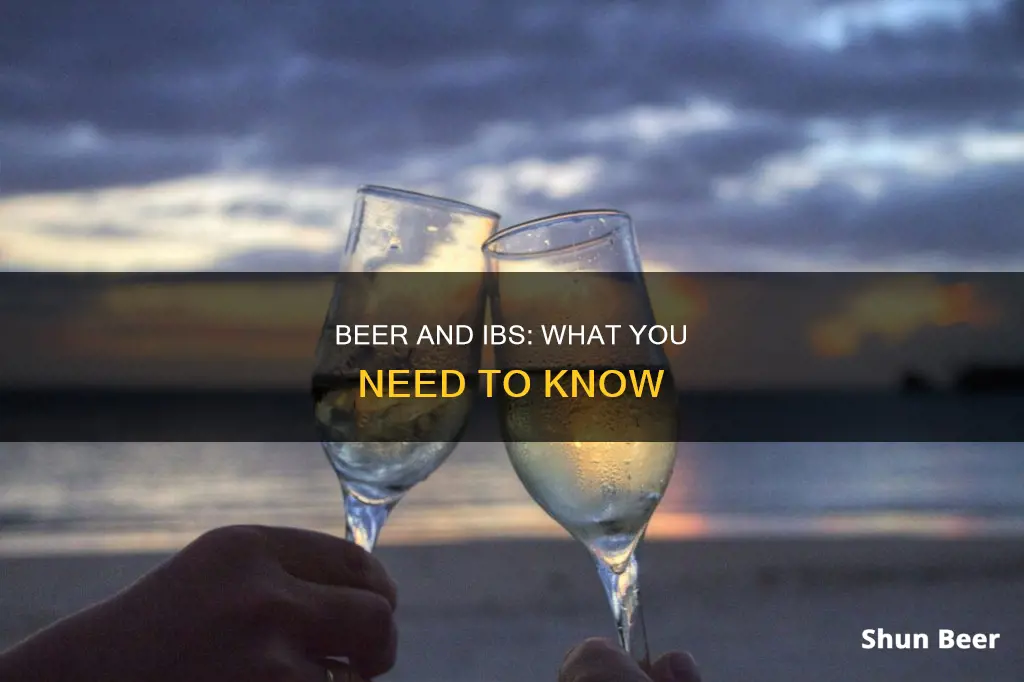
Irritable bowel syndrome (IBS) is a common condition that affects millions of people worldwide. The symptoms of IBS vary but usually include abdominal pain, constipation or diarrhoea, bloating, and gas. While the exact cause of IBS is unknown, certain triggers have been identified, including food and beverages, hormones, and stress. Alcohol is a known gut irritant and can affect intestinal motility, intestinal absorption, and permeability. It can also contain FODMAPs (fermentable oligosaccharides, disaccharides, monosaccharides, and polyols), which may trigger IBS symptoms such as bloating, pain, and gas.
So, can you drink beer with IBS? The answer is not straightforward and depends on individual triggers and sensitivity levels. While some people with IBS must completely eliminate alcohol from their diet, others can still enjoy an occasional drink. Beer is often cited as a type of alcohol that can worsen IBS symptoms, and some individuals find relief by avoiding it or choosing a gluten-free option. However, everyone's experience with IBS and alcohol is unique, and the best approach is to understand your body's reaction to alcohol and adjust your intake accordingly.
| Characteristics | Values |
|---|---|
| Alcohol consumption for people with IBS | There are mixed reviews on whether people with IBS should consume alcohol. While some people with IBS have to eliminate alcohol from their diet, others can still enjoy an occasional drink. |
| Alcohol as a gut irritant | Alcohol is a gut irritant and can affect intestinal motility, intestinal absorption, and permeability. |
| Alcohol and IBS symptoms | Alcohol can cause increased cramping or bloating, and can also lead to diarrhoea or constipation. |
| Alcohol and gut bacteria | Alcohol can impact gut microbiota (gut bacteria) and lead to a disruption of good gut bacteria. |
| Low FODMAP alcoholic drinks | Red wine, dry white wine, sparkling wine/champagne, vodka, gin, tequila, whisky, and beer (gluten-free) are considered low FODMAP drinks. |
| High FODMAP alcoholic drinks | Sticky/fortified wine, liqueurs, cocktails, cider, sweet wines (e.g. dessert wines, port, sparkling wine), and rum. |
| Tips for drinking with IBS | Drink water between alcoholic drinks, eat food when drinking, choose low FODMAP drinks, and limit consumption to one drink per day for women and two drinks per day for men. |
What You'll Learn

Alcohol is a gut irritant
Alcohol has a weakening effect on the esophageal sphincter, which can trigger acid reflux. It can also speed up the movement of the muscles of the intestine, increasing the risk, severity, and frequency of diarrhea. Additionally, alcohol can reduce the absorption of nutrients in the small intestine, leading to problems with gas and diarrhea as these substances interact with bacteria in the large intestine.
The impact of alcohol on IBS symptoms varies from person to person. While some people with IBS may need to eliminate alcohol completely, others can still enjoy an occasional drink. It is important to understand your personal triggers and how your body reacts to alcohol to determine if and how much alcohol you can consume without irritating your gut.
Beer and Bypass Surgery: What You Need to Know
You may want to see also

Alcohol affects the small intestine
Alcohol can have a detrimental effect on the small intestine, impairing its function and structure.
Alcohol is absorbed in the upper intestinal tract and then enters the liver. However, the small intestine is also involved in the metabolism of alcohol, with enzymes in the intestinal mucosa and bacteria in the GI tract contributing to this process.
The small intestine is where most nutrients are absorbed into the bloodstream. Alcohol can interfere with this process, inhibiting the absorption of water, sodium, glucose, amino acids, and fatty acids. This can lead to malnutrition and weight loss commonly observed in people with alcohol dependence.
Alcohol can also impair the muscle movement in the small intestine, contributing to the diarrhoea frequently observed in people with alcohol dependence. It can further cause direct damage to the mucosal lining of the small intestine, increasing the risk of acute gastrointestinal bleeding and allowing toxins to pass more easily into the bloodstream.
Additionally, alcohol can affect the intestinal immune system, decreasing the innate immune response and triggering an inflammatory response. This can lead to local and systemic inflammation and increase the risk of intestinal pathogens.
Overall, alcohol can have a range of negative effects on the small intestine, impacting its structure, function, and the body's ability to absorb nutrients.
Drinking Beer on a Boat in Pennsylvania: What's Legal?
You may want to see also

Alcohol affects the esophageal sphincter
Alcohol can have a detrimental impact on the oesophageal sphincter, a muscle that acts as a valve to prevent food and acid from travelling back up the oesophagus. When this muscle is weakened, it can cause acid reflux, which occurs when stomach acid flows back into the oesophagus. This can lead to gastroesophageal reflux disease (GERD), a condition characterised by the abnormal reflux of gastric contents into the oesophagus.
Alcohol consumption can weaken the oesophageal sphincter, triggering acid reflux and potentially causing or exacerbating GERD. This is because alcohol can relax the lower oesophageal sphincter, allowing acid to flow back up the oesophagus and irritate its lining. This can result in a burning sensation and difficulty swallowing.
In addition to triggering acid reflux, alcohol can also directly damage the oesophageal sphincter and the oesophageal mucosa. This damage can be caused by both acute and chronic alcohol ingestion. Acute alcohol consumption may relax the oesophageal sphincter, allowing stomach contents to flow back up the oesophagus. On the other hand, chronic and long-term alcohol consumption can lead to abnormalities in the pressure of the oesophageal sphincter and esophageal motility.
The effect of alcohol on the oesophageal sphincter can vary depending on the type of alcoholic beverage. For example, spirits are more likely to damage the oesophageal sphincter than wine or beer. Additionally, the amount of alcohol consumed also plays a role, with heavy drinking being more likely to cause issues than moderate or occasional drinking.
Texas Beer Laws: Drinking While Driving
You may want to see also

Alcohol affects the stomach
Secondly, alcohol interferes with gastric acid secretion and can impact the stomach's ability to destroy bacteria. This interference can allow potentially harmful bacteria to enter the upper small intestine, which can lead to further health complications.
Thirdly, alcohol can slow down stomach emptying, particularly when consumed on an empty stomach. This delay in emptying the stomach can cause feelings of nausea and vomiting.
Finally, alcohol can stimulate appetite by increasing the flow of stomach juices. This can lead to overconsumption of food and subsequent weight gain.
It is important to note that the effects of alcohol on the stomach can vary from person to person, and some individuals may experience more severe symptoms than others.
Ice Fishing and Beer: What You Need to Know
You may want to see also

Alcohol and IBS in women
Irritable bowel syndrome (IBS) is a common gut disorder that affects millions of people worldwide. While the exact cause of IBS is unknown, it is believed to be related to problems with how the brain and gut interact. The symptoms of IBS vary but usually include abdominal pain, constipation or diarrhoea, bloating, and gas. Women are more likely to have IBS than men, so researchers believe that hormonal changes may worsen symptoms.
If you are a woman with IBS, you may wonder how alcohol will affect your symptoms. Alcohol is a known digestive system irritant and can affect the working of the digestive system in several ways. For example, alcohol can weaken the oesophageal sphincter, leading to acid reflux. It can also increase acid secretion in the stomach and slow down stomach emptying, causing nausea and vomiting. In addition, alcohol can reduce nutrient absorption in the small intestine, leading to problems with gas and diarrhoea.
So, what does the research say about the link between alcohol and IBS in women? A 2010 study in the Journal of Gastroenterology and Hepatology found that women with IBS were more likely to experience diarrhoea, nausea, stomach pain, and indigestion after a night of drinking than men. The study also found that these symptoms were more common in women with diarrhoea-predominant IBS than those with constipation-predominant or mixed-type IBS. Another study from 2013, published in the American Journal of Gastroenterology, found that women with IBS were more likely to experience next-day digestive symptoms after a night of binge drinking compared to moderate or light drinking.
Based on the available research, there is no clear answer regarding whether women with IBS should avoid alcohol completely. It seems that the decision to drink or not drink is a personal one and depends on how your body reacts to alcohol. If you choose to drink, it is recommended to drink in moderation and follow national guidelines, which suggest no more than one drink per day for women. It is also important to pay attention to your consumption and how it affects your IBS symptoms. If you notice an increase in symptoms, consider abstaining from alcohol or limiting your consumption further.
To reduce the risk of worsened IBS symptoms, you can try the following tips:
- Drink plenty of water to stay hydrated and dilute the alcohol.
- Eat a meal before or with your drink to protect the lining of your digestive tract.
- Slow down your intake to give your digestive system time to process the alcohol, potentially reducing next-day symptoms.
- Choose low-FODMAP alcoholic beverages, such as vodka, gin, or red wine.
- Avoid carbonated and high-fructose beverages, as these can cause gut spasms and increase the risk of bloating and pain.
Stoop Drinking: Beer, Law, and You
You may want to see also
Frequently asked questions
There is no clear answer to this question. Alcohol is a gut irritant and can affect intestinal motility, intestinal absorption, and permeability. Beer is carbonated, which can cause gut spasms and swelling of the abdomen. However, beer is low in FODMAPs, which are carbohydrates that often trigger IBS symptoms. The best way to know if you can drink beer with IBS is to monitor your alcohol consumption and how it affects your body.
If you choose to drink alcohol, it is recommended that you limit your consumption to one drink per day for women and two drinks per day for men. It is also a good idea to drink a glass of water between each alcoholic beverage and to eat food when drinking.
Some lower FODMAP alternatives to beer include red wine, dry white wine, sparkling wine/champagne, vodka, gin, tequila, and whiskey.
If you experience IBS symptoms such as cramping, stomach pain, bloating, gas, diarrhea, or constipation after consuming alcohol, you should consider eliminating it from your diet.







